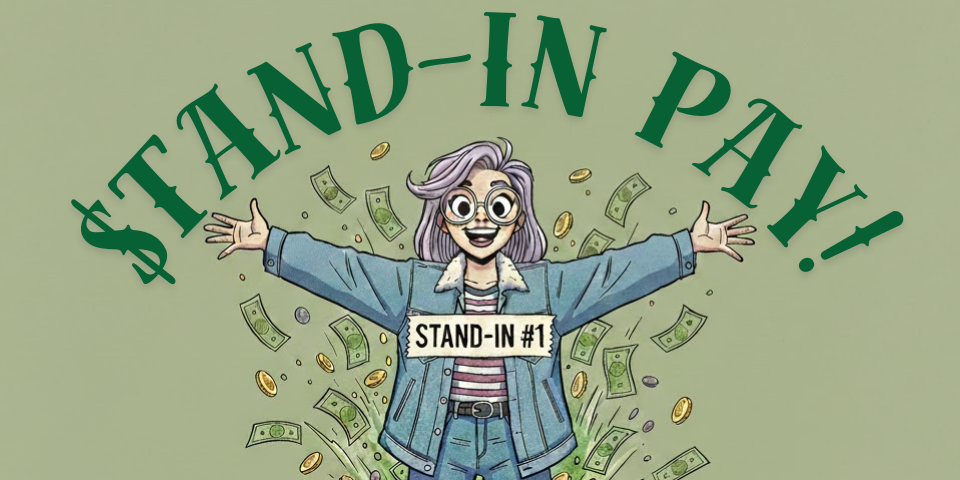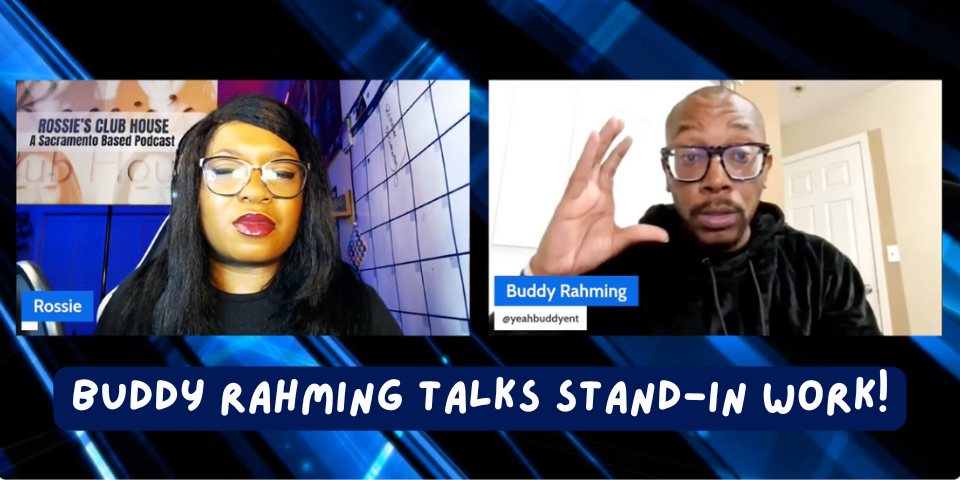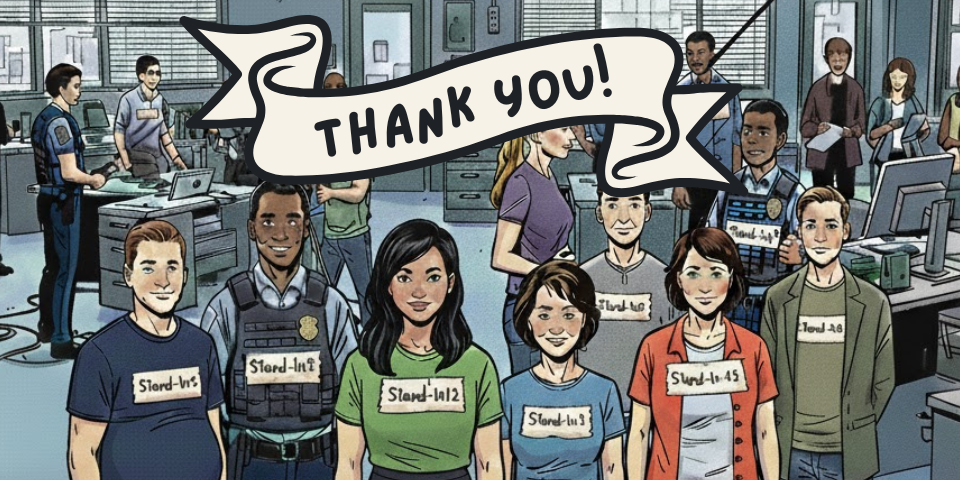When you’ve stood in on a production, you may have been faced very suddenly with being asked to do something more than typical stand-in work.
It might be that you’re asked to do something like work that borders on stunt work, or work of a hazardous nature, or work that you are not comfortable performing without additional compensation whatever it may be.
An industry insider recently shared with Stand-In Central his advice when it comes to negotiating for yourself when you’re asked to do more than typical stand-in work. (His advice generally applies for other workers on set, as well as work outside the entertainment industry.)
Committing to memory some of his advice now may aid you in the high-pressure moment when you’re confronted with doing more than you feel comfortable doing at your stand-in rate.
The Scenario
Let’s say that you’re working as a stand-in, and you’re asked to do full second-team rehearsals. Let’s then say that the actor for whom you’re standing in falls down in the scene, and let’s also say that production has instructed you also to fall during second-team rehearsals.
As you may be aware, many times if a fall is performed during a take, a stunt coordinator may be present to ensure the fall is safe. Other times, stunt performers and/or stunt doubles may be hired to perform the fall.
All in all, performing a fall as a stand-in may be considered hazardous work, and hazardous work generally implies work in excess of what is demanded of a stand-in. Under a union contract, a fall might entitle the stand-in to either a stunt contract or hazard pay — in other words, additional compensation.
Your Leverage
Your leverage in negotiating for additional compensation lies mostly in your ability to stall production.
As explained by the industry insider, productions have a callsheet that details the day’s work. The callsheet is essentially a large list of “things to do,” of which some work may depend on daylight to shoot, and others of which may depend on access times to locations, turnaround times, or other logistics.
If you are confronted with work that you do not want to do without additional compensation, your leverage in gaining additional compensation lies largely in your refusal to do the hazardous work until you are clear on the terms of compensation. If you refuse to do hazardous work, you potentially slow down production until either production resolves your issue or finds someone else to do the hazardous work. In general, given the amount of “things to do” on the callsheet, delays in production must be avoided, which gives you your leverage in negotiating for additional compensation when asked to do outsized work.
That said, you lose a lot of your leverage at earning additional compensation should you follow through with the work without clarity on your terms of compensation rather than stall production. In general, it is a harder negotiating position for additional compensation if you have already performed the work. While it is plausible that doing one hazardous take doesn’t mean you can’t stall a second hazardous take, it is also plausible you might be able to negotiate more for yourself if you refuse to do any hazardous takes.
So, all in all, the industry insider advocated resolving your request for additional compensation before doing the hazardous work, even if that means stalling production. It also may mean refusing to do the hazardous work if no terms can be agreed upon.
Memorize This: What to Say When Negotiating for Yourself on Set
If you are on a SAG-AFTRA production, a field representative may be present on your job to protect you and your interests in additional compensation should you be asked to do more than a typical stand-in would. That said, it is also likely that a field representative may not be present on the day or at the time of your compensation issue. This would mean you may have to negotiate on your own behalf if you want additional compensation.
The industry insider developed a series of sentences he recommended committing to memory when approaching additional compensation on set. He said that those who have used these phrasings have had exciting success in reaping additional compensation.
While the exact wordings can vary, here is the series of sentences you can use to open negotiations on a set. In general, you would say this to a 2nd 2nd AD or someone higher up. With respect to the additional work, say:
- Sounds great/awesome.
- We’re gonna nail it.
- What’s the deal/arrangement (on that) just so I’m clear/just so we’re on the same page?
The Significance of Each Sentence
“Sounds great/awesome.”
This expression helps to convey your excitement about the work ahead. You can use any word like “great” or “awesome” that conveys you agree with the work ahead of you and that it excites you.
“We’re gonna nail it.”
Note the use of the word “we” in this sentence. This sentence helps to convey that you’re part of the team trying to get the work on the callsheet done. Not only that, this sentence expresses your confidence that you and the others on the team can accomplish it. Use of the phrase “nail it” is intentional, as it is a more familiar phrasing rather than something technical or contractual. Such familiar phrasing helps to keep stakes low and negotiations non-threatening.
“What’s the deal/arrangement (on that) just so I’m clear/just so we’re on the same page?”
So you’ve been asked to fall down in second-team rehearsals? This is the deal or arrangement that you’re seeking clarity on. The implication of this sentence is you want to be clear about the additional compensation you’ll receive for doing the outsized work. The objective of this sentence is to get the AD to be explicit about any additional compensation production will grant you so that you can make sure you are granted that when you leave for the day.
The Ask
After you’ve expressed the three sentences above, you likely will have conveyed that you’re friendly, you’re a team player, and you just want a little clarity on your compensation for doing the additional work.
If you’re confronted with saying more, the industry insider has advice: Never, ever ask the AD a question with a yes or no answer. Always aim to ask open-ended questions.
For example, he advises rather than asking the question “Can I get a bump for this?,” instead saying “I think we both know this entails more than typical stand-in work, so I think $250 for 8 is really fair.”
In general, it may be more helpful to say first what compensation you want for the hazardous work so that the AD can’t lowball you or make it harder for you to negotiate a higher amount. It may also be helpful to you to ask for more than what will make you happy, because a) if you get it, you’ll be very happy, and b) if you don’t get it, you still have room to receive a happy amount of additional compensation.
At this point, you might have your offer accepted and be on your merry way performing the work asked of you. Or you might hear a counteroffer from the AD. If you hear a dollar amount from the AD that still works for you, you can then move forward with the hazardous work. But if you hear a dollar amount from the AD that doesn’t work for you, you can provide another counteroffer for an amount that will still work for you. Keep in mind that a right amount may never be had and you may end up not doing the hazardous work at all.
Words to Avoid Using When Negotiating for Yourself
The industry insider shared with Stand-In Central some words to avoid using when negotiating for yourself on set. Words like “contract,” “union,” “upgrade,” “stunt,” “claim,” and others like them tend to make the negotiation formal and threatening, and citing them may make it harder for the AD to get you your additional compensation.
In general, while negotiating for yourself is a very serious matter in some cases, in an effort to get additional compensation, you want to try to keep the speech informal and less threatening — even friendly. As seen above, words and phrases like “great,” “awesome,” “nail it,” “just so I’m clear,” “just so we’re on the same page,” etc., help to keep the negotiation seem less formal and more friendly.
What Additional Compensation Should You Ask For?
Since a production will be more inclined to pay nothing additional to a stand-in for performing a fall, it is wise to presume that the stand-in will be harder pressed to negotiate a stunt contract than hazard pay in such a situation as the scenario outlined above. (A stunt contract is most cases compensates more than a hazard payout.)
Furthermore, it is possible that stunt coordinators — despite most being members of SAG-AFTRA — may not be on your side in arguing that your fall constitutes a stunt, so negotiating for a stunt contract may be very hard to do on your own. Negotiating for hazard pay may be a wiser strategy when negotiating for yourself on set, but each situation is different.
That said, do some research ahead of time. When you see SAG-AFTRA field reps, ask them about going rates for hazardous work or other kinds of work you might encounter above and beyond standing in. Are you being asked to memorize lines? Perform lines off camera for actors during takes? Bring multiple options of color cover every day to set? Fund your own meals when traveling with production, without a per diem?
There could be a number of instances stand-ins find themselves in that may or may not be clear in the SAG-AFTRA collective bargaining agreements (CBAs) that inevitably require stand-ins to look out for their own additional compensation. Knowing both the CBAs you work under and “going rates” for particular kinds of additional work from field reps may help you to negotiate for yourself and get what you want in the negotiation.
Summary
So, as the industry insider shared, it is helpful to memorize the following speech:
- Sounds great/awesome.
- We’re gonna nail it.
- What’s the deal/arrangement (on that) just so I’m clear/just so we’re on the same page?
Set it to memory, and you may find you’re much faster on the road to negotiating for yourself additional compensation when you’re standing in.
Do you have other negotiation tips? How have you leveraged a production to promise you better pay? Share your experiences below!
Discover more from Stand-In Central
Subscribe to get the latest posts sent to your email.






Leave A Comment